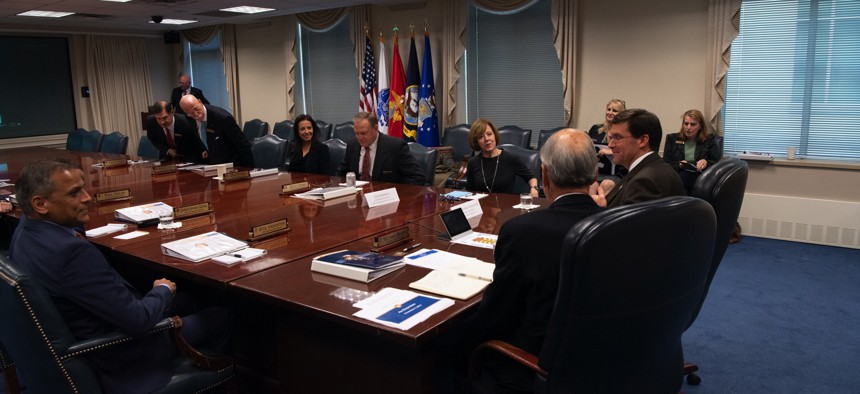
Then-Defense Secretary Mark T. Esper hosts the Defense Business Board Quarterly Meeting at the Pentagon, Washington, D.C., Nov. 6, 2019. Marine Cpl. Marcos A. Alvarado/Defense Department
Viewpoint: Keep Politics Out of National-Security Advisory Boards
Trump’s appointment of loyalists to DHS and DOD boards sets a dangerous precedent.
Although we are less than six weeks away from President-Elect Joe Biden’s swearing in, President Trump continues his federal government makeover.
Twice this month, members of the Pentagon’s longstanding and apolitical Defense Business Board were replaced with partisan Trump loyalists, including two former campaign managers. It is a dangerous precedent, and if replicated in other federal agencies, will have a damaging impact on the security of the United States and the safety of the American public.
The Defense Business Board is one of many Federal Advisory Committees across 50 federal government agencies—hugely important, deeply influential, and virtually unknown outside the Beltway. Since their creation in 1972, they have been comprised of unpaid, private citizens who provide real-time real-world independent advice to Cabinet members and agency leadership on areas within their responsibility. The subject-matter experts serving on these committees deliver invaluable insight on critical issues, supporting and enhancing the work of the agency’s own team.
Alejandro Mayorkas, the nominee for Secretary of Homeland Security, along with other newly installed Cabinet members across the government, will inherit them. The Department of Homeland Security Advisory Council, or HSAC, is one such advisory board, established by Executive Order in 2002 by then-President George W. Bush.
Every DHS Secretary since 2002, Republican and Democrat alike, has sought nonpartisan HSAC counsel in the creation and implementation of critical policies for the security of the homeland. Since its creation, HSAC recommendations have ranged from examining emerging technologies, such as artificial intelligence and the impact on the security landscape, to ensuring that interdependent infrastructure sectors can work together to restore critical services after a cyberattack.
In our respective roles as members of and executive director of the HSAC, we led a small nonpartisan group of experts to provide recommendations to U.S. Customs and Border Protection regarding model use of force policies and prevention of corruption, as well as how to increase transparency and stakeholder outreach about incident response and discipline issues. This HSAC report was apolitical, and informed work across the homeland security enterprise. Indeed, our previous jobs may have been political in nature, but our service to the HSAC and the nation never was.
One of the most important characteristics of advisory committees like the HSAC is their nonpartisan composition and apolitical operation. Members, selected based on their experience and expertise, are the volunteer workhorses behind the scenes. To be effective, their advice and recommendations have always been and should always be informed by facts and evidence and free of partisan political considerations.
Today, our threat landscape is more complicated than ever before. We are plagued not only by the obvious health and national security threat of the coronavirus but also by many related consequences, including the threat to data privacy and security during the pandemic. We also face future pandemic diseases requiring planning and investment in bio surveillance and outbreak systems.
DHS is among the lead federal agencies with responsibility for addressing all of these homeland threats and preventing future terrorist attacks while handling natural disasters, election security, cybersecurity, aviation, border, port, and maritime security, plus a wide range of chemical, biological and nuclear threats.
Even the U.S. Coast Guard, another DHS component, finds itself confronting an ever-changing threat landscape. We saw this play out recently when the icebreaker Polar Star was reassigned by the Coast Guard to the Arctic from its normal role supporting Antarctica affairs due to concerns stemming from the coronavirus pandemic
No matter who occupies the White House, bad actors continue to plot and plan attacks against America including domestic and foreign terrorists, international organized crime, cyber criminals just to name a few. These threats to our democracy do not just pose a hazard to Democrats or Republicans, but to everyone.
As former Defense Business Board member Steve Blank, who resigned in protest of Trump’s actions said, “The abrupt termination of more than half of the Defense Business Board and their replacement with political partisans has now put the nation's safety and security at risk. My service to the Department of Defense was a service to the country, not to a party.”
It takes a whole-of-government and whole-of-society approach with experts in and out of the government to identify, stop, prevent, and build resilience against the complex and dynamic threats facing this country 365 days a year.
Americans should demand that all federal agency leaders inherit the same advisory council system of public-private service proven effective for decades: one built on experience not politics.
Karen Tandy is the Vice-Chair of the Homeland Security Advisory Council and was appointed by President George W. Bush as head of the U.S. Drug Enforcement Administration. She has served in Repulibcan and Democratic administrations.
Sarah Morgenthau was the Executive Director of the Homeland Security Advisory Council and a Deputy Assistant Secretary at DHS under President Obama.
NEXT STORY: National Guard Helping to Roll Out COVID Vaccine






